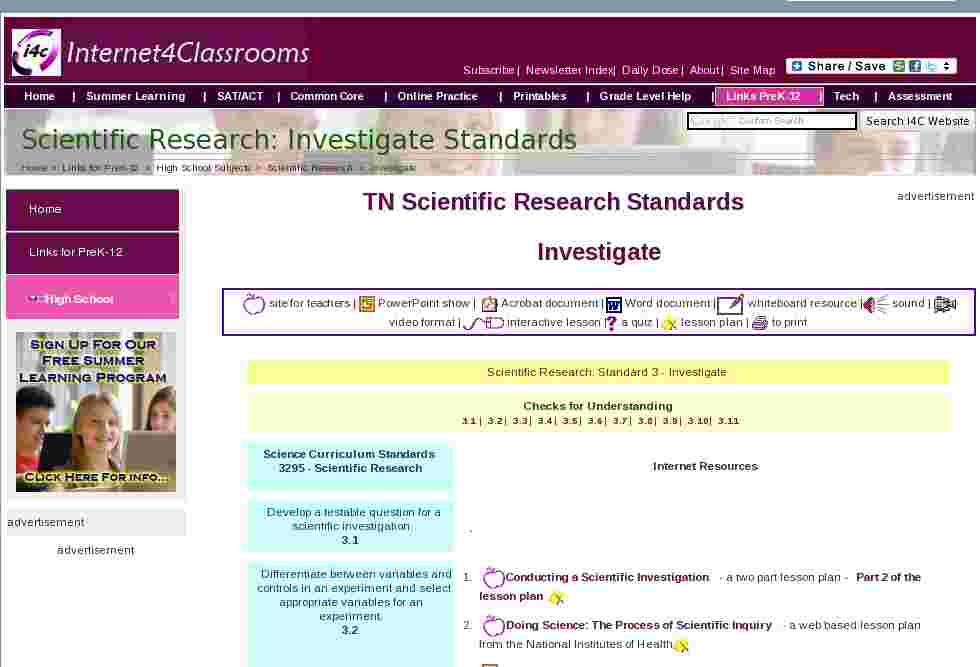TN Scientific Research Standards
Investigate
site for teachers |
PowerPoint show |
Acrobat document |
Word document |
whiteboard resource |
sound |
video format |
interactive lesson |
a quiz |
lesson plan |
to print
Science Curriculum Standards
3295 - Scientific Research
Conducting a Scientific Investigation - a two part lesson plan - Part 2 of the lesson plan
Doing Science: The Process of Scientific Inquiry - a web based lesson plan from the National Institutes of Health
How Science works: Types of Variables - Explains the difference between 'categoric', 'ordered', 'discrete' and 'continuous' variables, with examples.
How Science works: Variables - Explains the meaning of 'independent', 'dependent' and 'control' variables, with examples from typical practicals.
- Identify the Controls and Variables - worksheet to print and use in class [the author of this activity probably violated copyright by using Simpson's characters, but you will not be guilty if you use it in class]
- Basic format of any hypothesis test - from Skills4Study
Conducting a Scientific Investigation - a two part lesson plan - Part 2 of the lesson plan
- Designing Science Experiments - from Crystal Clear Science Fair Projects
Doing Science: The Process of Scientific Inquiry - a web based lesson plan from the National Institutes of Health
- Experiment - Wikipedia entry
- How to Use the Scientific Method to Test a Hypothesis - six steps are listed
How Science works: Types of Variables - Explains the difference between 'categoric', 'ordered', 'discrete' and 'continuous' variables, with examples.
How Science works: Variables - Explains the meaning of 'independent', 'dependent' and 'control' variables, with examples from typical practicals
- Hypothesis Test - from Cool Science Projects.com
- Hypothesis test 1: an experiment on telepathy - used as an example of the process
- Hypothesis test 2: the shuffle test - using statistical analysis
- Identify the Controls and Variables - worksheet to print and use in class [the author of this activity probably violated copyright by using Simpson's characters, but you will not be guilty if you use it in class]
- Practicing Scientific Processes - from Glencoe Science
- Statistical hypothesis testing - Wikipedia entry
- Student Design of Drop Bounce Experiment -
- Test Your Hypothesis - from Lane Libraries Science Fair Zone
- British and Metric Conversions - a series of pages relating to converting to or from metric units
- Calculating the Density of a Liquid - tutorial on the math involved plus sample questions
- Calculating Density of a Solid - tutorial on the math involved plus sample questions
- Converting Fahrenheit to Celsius - interactive problem from Annenberg
- Converting Length Measurements - use your knowledge of meters, centimeters and millimeters to answer questions to build a shed

- Finding the Mass of an Object - tutorial on using a triple-beam balance which includes questions to answer
- Finding the Volume of an Object - tutorial on using a graduated cylinder which includes questions to answer
- Platform Scales Addition - weigh several items and find the sum in hundredths of a gram
or
- Platform Scales Subtraction - weigh several items and find the difference in hundredths of a gram
or
- Teaching Measures - links to length, mass, or capacity activities and printables - good for using on an interactive whiteboard for a whole class activity
- Transparency Master - use this high quality picture of a block of metal on a triple beam balance as a review for your students
- Using a Graduated Cylinder - [L and mL] a whole class activity for reading a scale, estimating and converting between units
or
- Using a Platform Scale - practice using scales like the one in a doctor's office, five Gregs will drop on the scale, waiting to be weighed, see how quickly you can weigh them
or
- Using a Ruler - a whole class activity for reading a ruler, estimating and converting between units
or

Search Internet4Classrooms
 Custom Search
Custom Search
- Site Map |
- About Us |
- Teacher Training |
- Make Internet4Classrooms.com your home page. |
- Copyright © 2000-2024 Internet4Classrooms, LLC All rights reserved.
Use of this Web site constitutes acceptance of our Terms of Service and Privacy Policy.
1744510355033386 US 11 desktop not tablet not iPad device-width